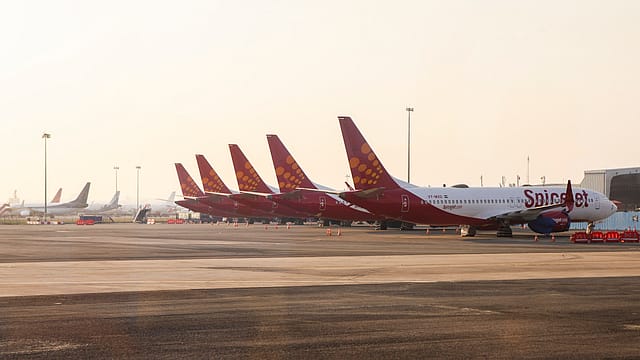SpiceJet fully repays $24 million to Credit Suisse, ending decade-long dispute
ADVERTISEMENT

SpiceJet said on Monday that it successfully repaid the entire $24 million it owed to UBS-owned Credit Suisse. The repayment fulfils the terms of the settlement agreement signed between the low-cost carrier and Credit Suisse in May 2022.
“The completion of this payment is another important step in our continued efforts to put legacy issues firmly behind us. This settlement not only brings closure to an old liability but also demonstrates our resolve and ability to meet commitments despite a challenging operating environment,” said Debojo Maharshi, Chief Business Officer, SpiceJet, in a statement.
The two parties have been embroiled in a legal dispute over unpaid dues since 2015. The origin of the dispute dates back to 2011-12, when SpiceJet entered into a 10-year agreement with Swiss maintenance firm SR Technics for aircraft services. In 2012, SR Technics transferred the right to recover the money to Credit Suisse.
The dispute led to the Madras High Court ordering the winding up of the airline in 2021, after Credit Suisse filed a winding-up petition. However, SpiceJet appealed in the Supreme Court against the winding-up petition, which led to the apex court staying the winding-up order of the Madras High Court, allowing the two parties to negotiate. This culminated in the settlement agreement. It also provided a bank guarantee of $5 million as per the order by the Madras High Court.
January 2026
Netflix, which has been in India for a decade, has successfully struck a balance between high-class premium content and pricing that attracts a range of customers. Find out how the U.S. streaming giant evolved in India, plus an exclusive interview with CEO Ted Sarandos. Also read about the Best Investments for 2026, and how rising growth and easing inflation will come in handy for finance minister Nirmala Sitharaman as she prepares Budget 2026.
When the settlement agreement was executed in May 2022, Credit Suisse claimed a total of $41.77 million, which the parties agreed to settle for $24 million in a structured payment plan. The agreement involved paying a certain amount upfront, with the balance due over a mutually agreed-upon timeline.
In March 2023, Credit Suisse requested the Supreme Court to initiate criminal proceedings against SpiceJet and its founder, Ajay Singh, over the alleged deliberate and intentional non-compliance with court orders and failure to settle a $3.9 million debt as stipulated in a prior settlement agreement between the parties.
In September, the Supreme Court fulminated over SpiceJet’s non-payment of dues, and ordered it to pay $1.5 million—a third of which was part of the monthly settlement with Credit Suisse, and the rest was unpaid dues to the bank—or face “drastic action”. An irate Supreme Court, over the “dilly-dally business”, once even threatened to send founder Ajay Singh to Tihar Jail if he did not comply with the terms of the payment.
SpiceJet’s revenue from operations declined 36% year-on-year to ₹1,060 crore in the first quarter, from ₹1,646 crore in the corresponding quarter of the past financial year. On an Ebitda basis, the airline reported a loss of ₹18 crore in the first quarter, sharply lower than the profit of ₹402 crore in the same quarter last year. Passenger Revenue per Available Seat Kilometre stood at ₹4.74, while Passenger Load Factor remained healthy at 86%, the earnings report noted.
SpiceJet shares closed 2.90% lower at ₹33.45 on Monday.
